Albo to Macron: ‘We want to have the mutual benefit of free trade’
Prime Minister Anthony Albanese has revealed his solution to ironing out trade issues with France. See his message for President Emmanuel Macron.
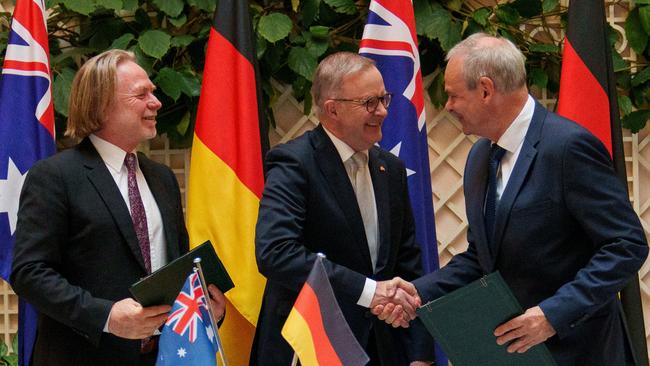
World
Don't miss out on the headlines from World. Followed categories will be added to My News.
Prime Minister Anthony Albanese is confident open and constructive discussion with President Emmanuel Macron will work out any trade issues with France.
Mr Albanese, who will attend the two-day NATO summit in Vilnius, Lithuania, is meeting with a range of world leaders on the sidelines and the issue of the Australia-European Union free trade deal will be top of the agenda. France is one of several European countries protecting its own farming interests which is blocking any agreement from making progress.
“My message to President Macron will be we want to conclude this agreement but we won’t be signing up to things not in Australia’s national interest,” Mr Albanese said. “In particular, we want access to European markets and we want to have the mutual benefit of free trade between Australia and Europe.
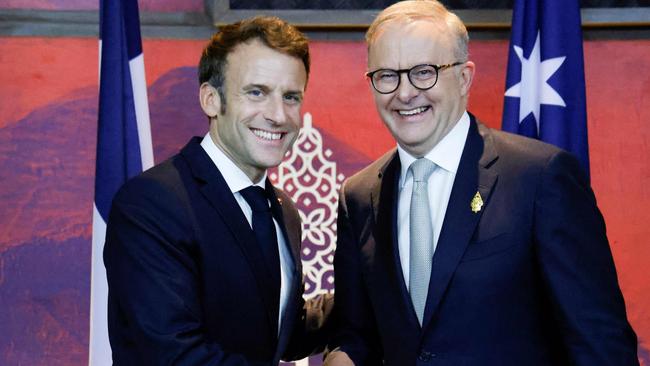
“France, of course, has raised some issues but I am confident they can be worked through and I will be having open and constructive discussion with President Macron.
“We are not asking for anything other countries have not received. It is important Australia get access to those markets.”
ALBO ALMOST ‘TAKEN OUT’ BY MOTORCADE
Anthony Albanese was lucky to avoid a nasty collision with his own security motorcade outside of the Brandenburg Gate on Tuesday.
The prime minister was crossing the cobbled area outside of Berlin’s most famous landmark at 6am local time when his motorcade moved to get into position to prepare for a quick exit to the airport to get to the Australian delegation to the NATO Summit in Lithuania.
“I was about to be the first prime minister to be taken out by his own motorcade,’’ Mr Albanese said with a smile.
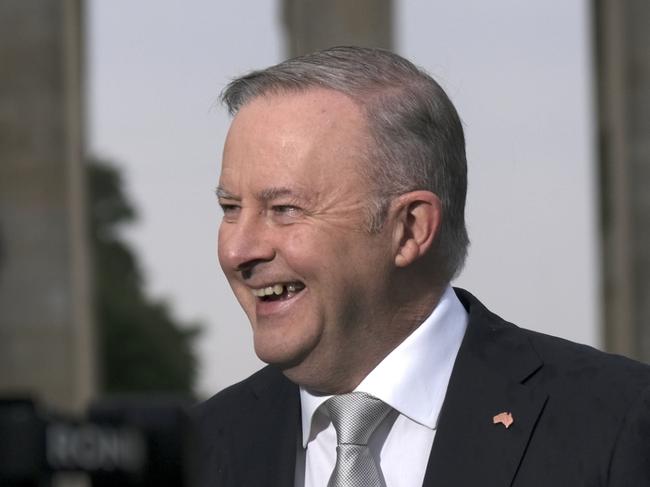
Mr Albanese indicated the deployment of Australia’s highly sophisticated surveillance plane, the Wedgetail, for the use of NATO forces in protecting the supply of weaponry into Ukraine was a result of a request from the United States.
He said the deployment of the aircraft and 100 military personnel, who will be passed at the NATO Allied Air command at Ramstein airbase in Germany, was for six months because “that‘s what was asked for’’.
He said: “deployments of course are usually time limited before there are rotations, we’ve been asked as part of the effort by Ukraine, our friends in NATO, including in particular the United States for this.”
Mr Albanese was pleased that Sydney man Chau Van Khan, head in Vietnam on national security charges since 2019, had been freed from a Vietnam prison after months of careful advocacy.
“Australia very much welcomes the release of Chau Van Khan, this I raised in visit to Vietnam, I thank our friends in Vietnam for listening and agreeing during my visit there. I was very pleased Mr Bowen was able to represent me and welcome Chau Van Khan back to Australia.”
ALBO COURTS GERMANY TO BOLSTER INDO PACIFIC INFLUENCE
Prime Minister Anthony Albanese believes Germany could have a greater presence in the Indo-Pacific, after Australia agreed to send its sophisticated surveillance E-7A Wedgetail early warning aircraft and 100 military personnel to the NATO allied air command base at Ramstein in Germany to help protect supplies going into Ukraine.
The warm relationships between Australia and Germany have deepened, Mr Albanese said, after meeting with Chancellor Olaf Scholz in Berlin and agreeing to sending the hi tech aircraft for six months to assist in protecting the transferral of various coalition assets into Ukraine. Australia’s military personnel will start arriving in Germany from October.
This week Germany sent 240 German paratroopers and marines to Australia for Exercise Talisman Sabre, a military exercise later this month mainly held across Queensland.
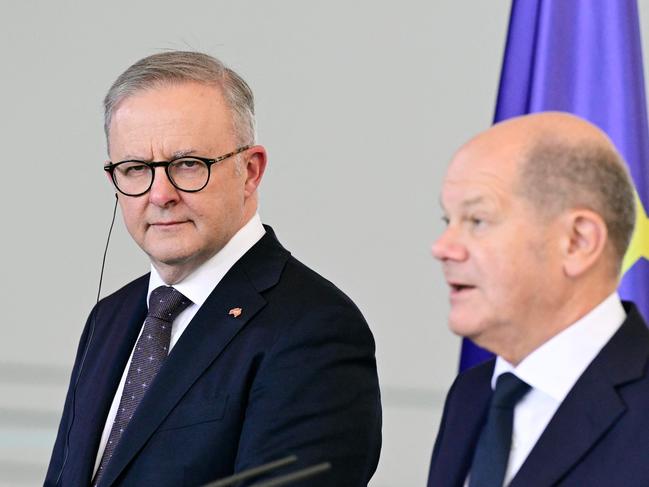
Mr Scholz has also given his support to Australia in regards to the European Union free trade deal, which currently faces major roadblocks in regards to French and Irish agricultural issues. Australia and Germany also agreed to build up supply chains for critical minerals and raw materials, by conducting a joint study to identify options for co-operation.
When asked why Germany and other NATO members were considering opening a NATO presence in the region in Japan, Mr Scholz says it is “now a very common practice’’ for NATO members to deploy military assets to the Indo-Pacific.
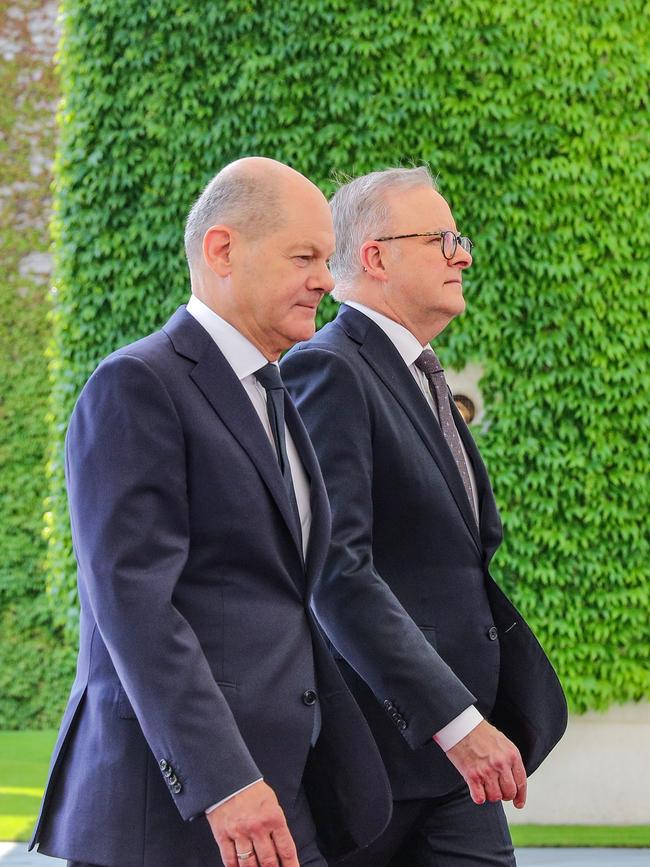
Australia, as well as New Zealand, South Korea and Japan have been invited to the two day NATO Summit in Vilnius as “Indo Pacific partners. NATO said this week that the Indo-Pacific is important for the Alliance because developments in that region can directly affect Euro-Atlantic security.
Mr Scholz said while NATO was a transatlantic alliance, and geographically located away from the Indo Pacific, he stressed it was important to continue military co-operation with countries in the region.
He said: “We share insights, we share positions, and this is why I think it is important that we need to continue the co-operation that we’ve had. For Germany and other NATO partners it’s become a very common practice to deploy their own ships, vessels, aircraft to the Indo-Pacific for exercises to develop common understanding and so forth, and we will continue to do that.”
Mr Albanese said Australia was participating in the two day NATO Summit in Vilnius because the country was invited, and he said “friends, such as Germany are always welcome to participate and to engage in our region’’.
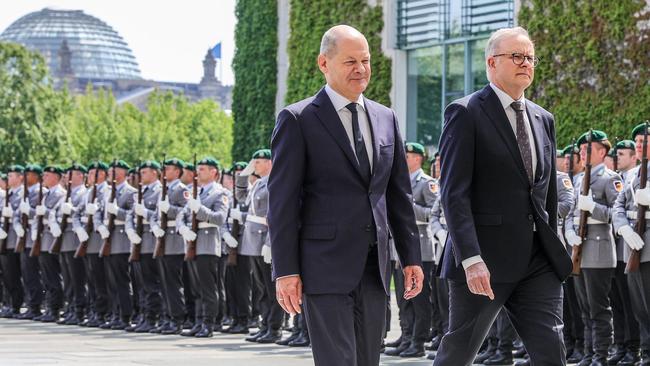
Ukraine will top the list of summit topics, including its ambitions to join the NATO alliance, and the need for more weapons.
“I see it as very positive and it is good thing that Chancellor Scholz has visited the region,’’ Mr Albanese said.
He said there was “a great opportunity” for even more co-operation with Germany and to have a greater presence by Germany in the Indo-Pacific, and a greater presence of Australia here in Europe.
“Because we have such common values, values of support for democracy, values of support for and respect for sovereignty, and for multilateralism through forums,” Mr Albanese said.
“Values which are consistent, as well, with regard to our economy. So I see a great opportunity to have even more co-operation with Germany and to have a greater presence by Germany in the Indo-Pacific, and a greater presence of Australia here in Europe.”
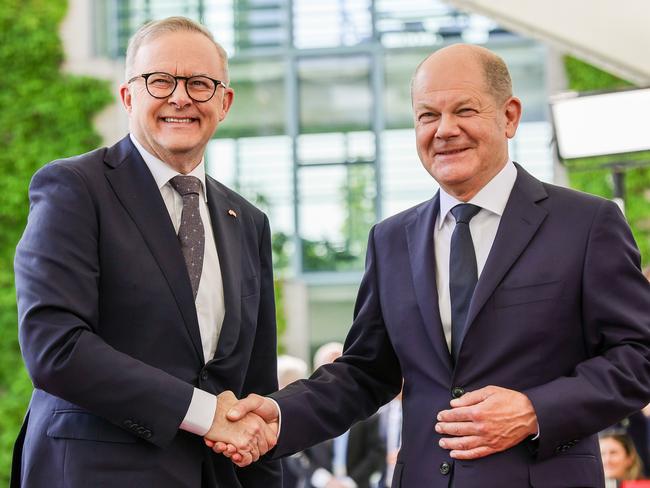
At a business function Monday evening at the Australian embassy, Mr Albanese told of his backpacking experience in 1988 - his first of six trips to Germany - when he travelled from Prague in Eastern Europe.
“It was very different place at that time, I came up through Eastern Europe, across West Berlin to see a fellow called Bruce Springsteen play and then got stuck and had to find somewhere to stay at night and then talk my way into then, what was the GDR, (East Germany) into the east even though I had single entry visa.’’
He laughed about “the skills I had to talk way into positions” adding, “back then my backpack was able to be rescued from a youth hostel somewhere in East Berlin. It was a very momentous trip.”
GERMAN TROOPS TO JOIN AUSSIE WAR GAMES
Hundreds of German troops will arrive in Australia this week and join with the United States and 11 other nations in extensive military exercises as a part of a “productive relationship that we are developing with our German friends” to boost defence in the Indo-Pacific.
Prime minister Anthony Albanese was spending Monday meeting with the German chancellor Olaf Scholz to strengthen the defence ties in Australia’s region as 240 German paratroopers and marines were already en route to Australia. Mr Albanese foreshadowed further announcements about these military connections after his scheduled two hour meeting on Monday evening.
The German military will take part in the comprehensive exercise, called Exercise Talisman Sabre, in Jervis Bay, NSW, Darwin and across Queensland alongside troops from Fiji, France, Indonesia, Japan, Republic of Korea, New Zealand Papua New Guinea, Tonga, the United Kingdom and Canada. As well, the Philippines, Singapore and Thailand will be observers.
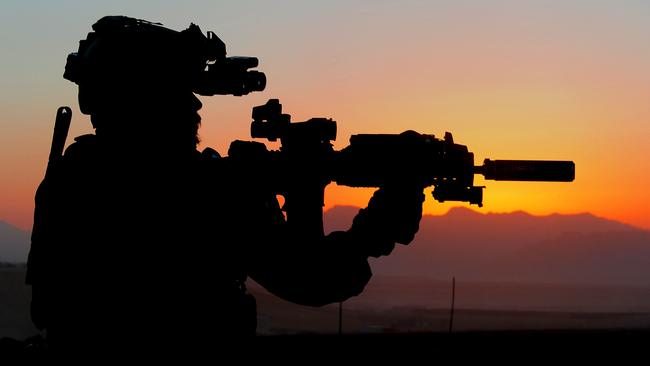
Talisman Sabre is to test planning and conducting combined and joint military operations to improve combat readiness and interoperability between Australian and United States‘ forces and other partner nations. The inclusion of Germany in the exercise is a reflection of the closer ties Australia has forged with the European nation in recent years, and not only a $1bn deal to export 100 Rheinmetall Defence Australia Boxer Heavy Weapon Carriers to Germany.
Last year the Germans participated in the Australian military exercises Pitch Black and Exercise Kakadu in the Northern Territory, but the involvement of 170 German paratroopers and 40 German marines this time is a big step up from previous engagements. It signifies Germany‘s interest and concern about China’s moves in the Indo-Pacific region.
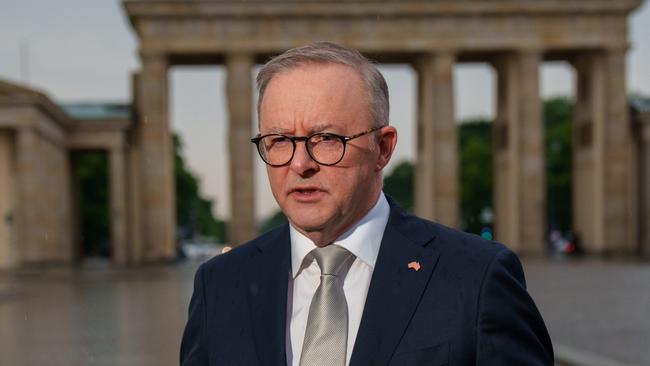
Mr Albanese said in Berlin ahead of meeting the German chancellor and then attending the two day NATO summit in Vilnius: “I‘m looking forward to having the opportunity to outline Australia’s position on international relations and defence issues, but also on showing solidarity that the Australian government has with NATO.”
He said Australia’s trade discussions with the German leader “are a part of the productive relationship that we are developing with our German friends”.
Asked about former prime minister Paul Keating’s attack on NATO and the leadership under secretary-general Jens Stoltenberg, Mr Albanese said: “Jens Stoltenberg is a friend of Australia. I‘ve met him on a number of occasions. And we need to remember the role that NATO is playing. There is a land war in Europe. This is a war about the international rule of law, about whether a large nation can seek to impose its will on a smaller nation. This is about national sovereignty. This is about the people of Ukraine, struggling to defend their democracy and their sovereignty. And Australia stands with the people and government of Ukraine. But we also support the extraordinary effort that NATO is showing, because this is a struggle. That is has implications for the whole world. I, I’m interested in looking forward to my constructive engagement with NATO.”
Originally published as Albo to Macron: ‘We want to have the mutual benefit of free trade’
Read related topics:Anthony Albanese




